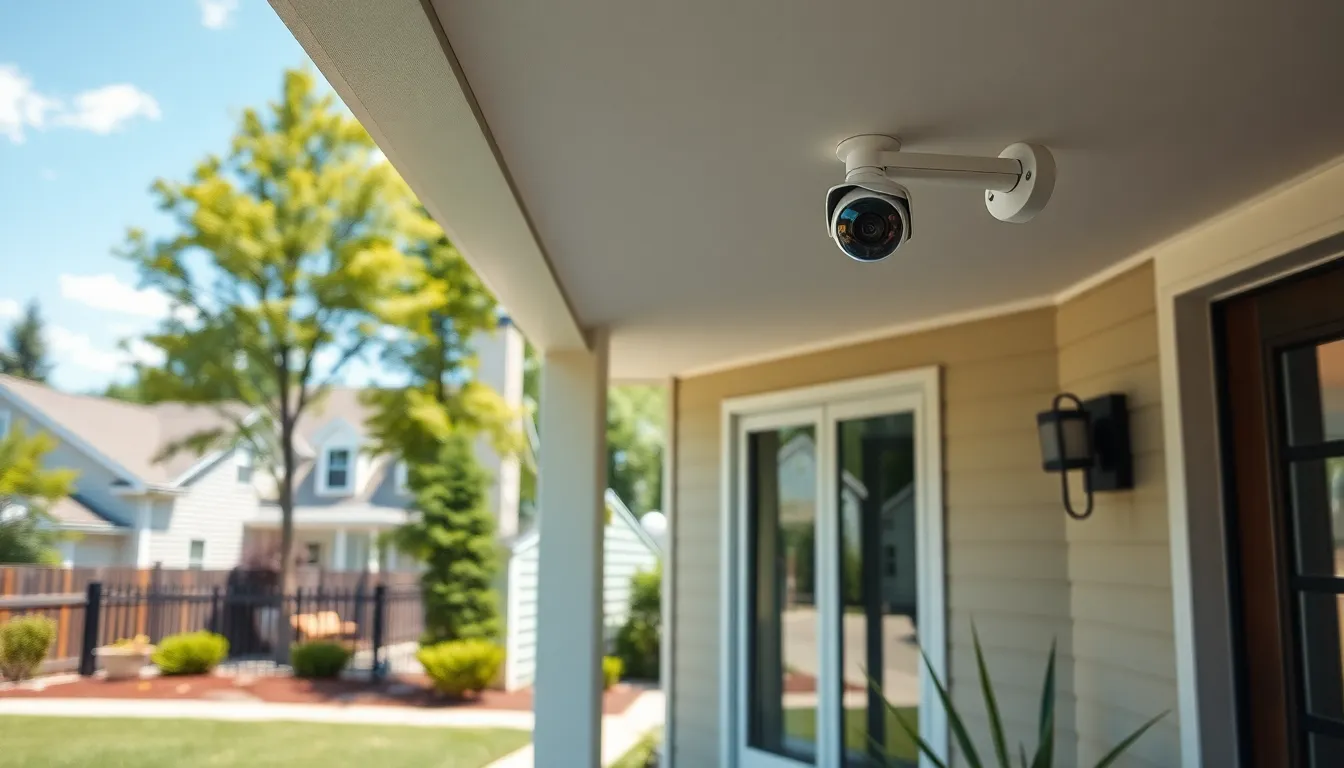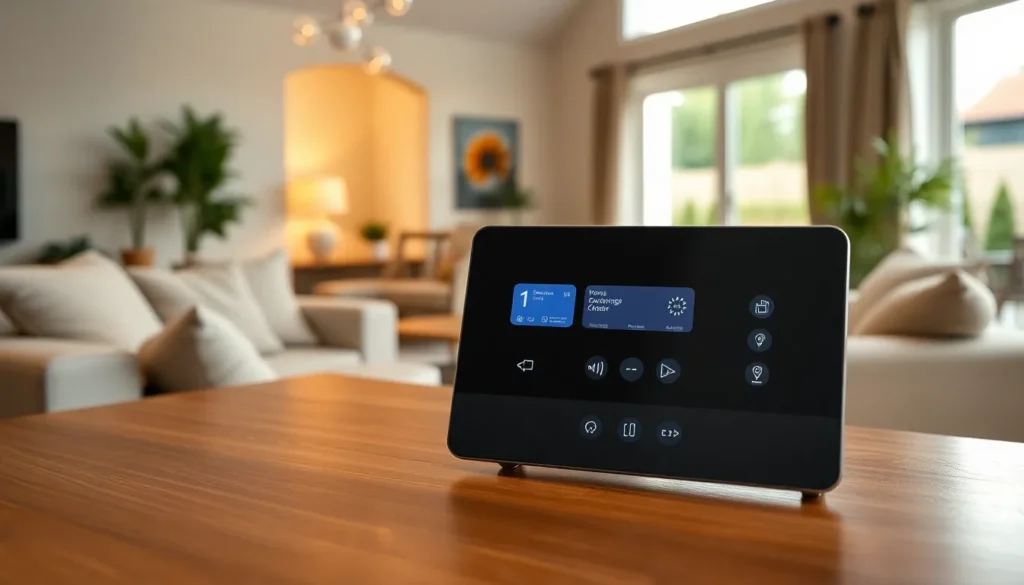Table of Contents
ToggleIn today’s world, home security is more crucial than ever. With rising concerns about break-ins and theft, having a reliable alarm system can provide peace of mind. Homeowners often find themselves overwhelmed by the myriad of options available, making it essential to have clear guidance on selecting the right alarm system.
Understanding the key features and benefits of various home alarm systems can empower individuals to make informed decisions. Whether it’s a basic setup or a sophisticated smart home integration, knowing what to look for can significantly enhance security measures. With the right information at hand, anyone can protect their home effectively and confidently.
Understanding Home Alarm Systems
Home alarm systems play a vital role in enhancing security and deterring potential intruders. Recognizing the types and key components of these systems assists homeowners in making informed choices.
Types of Alarm Systems
- Wired Alarm Systems
Wired alarm systems connect directly to the home’s electrical system. They offer reliable performance and reduced interference but require professional installation.
- Wireless Alarm Systems
Wireless alarm systems use radio signals for communication. They allow for easier installation and flexibility, making them ideal for renters or those wanting to avoid extensive wiring.
- Monitored Alarm Systems
Monitored alarm systems send alerts to a central monitoring service. They provide timely responses to emergencies, enhancing safety through professional oversight.
- Unmonitored Alarm Systems
Unmonitored systems rely on local alarms to alert homeowners and neighbors. While cost-effective, they lack professional monitoring and immediate emergency response.
- Smart Alarm Systems
Smart alarm systems integrate with home automation devices. They allow remote management via smartphones, increasing convenience and offering real-time notifications.
Key Components of Home Alarms
- Control Panel
The control panel acts as the brain of the system, allowing users to manage settings and respond to alerts.
- Keypad
The keypad provides a user interface for arming or disarming the system, typically featuring a numerical display for security codes.
- Sensors
Sensors detect unauthorized entry or movement. Common types include door/window sensors, motion detectors, and glass break sensors.
- Alarm Siren
The alarm siren emits a loud sound to deter intruders and alert occupants. Its volume and tone vary by model.
- Cameras
Surveillance cameras enhance security by providing visual monitoring. They can be wired or wireless and often include features like night vision and motion detection.
- Backup Power Supply
A backup power supply ensures system functionality during power outages. Battery-operated systems typically maintain performance for several hours.
Benefits of Home Alarm Systems

Home alarm systems provide significant advantages for enhancing security and peace of mind for homeowners. They deter criminal activity while offering potential financial benefits.
Enhanced Security
Enhanced security emerges as a primary benefit of home alarm systems. Indicators include high-quality sensors that detect unauthorized entry, along with surveillance cameras that monitor activity in real-time. These components create a fortified environment that discourages intruders. Additionally, audible alarms alert homeowners and neighbors to suspicious behavior, prompting immediate action. Systems that integrate smart technology allow remote monitoring via smartphones, ensuring homeowners stay connected to their property at all times. Research indicates that homes equipped with alarm systems face a lower risk of break-ins compared to those without, making them a wise investment.
Insurance Benefits
Insurance benefits come from installing alarm systems, potentially resulting in reduced premiums. Many insurance companies offer discounts for homes equipped with security systems, recognizing the decreased risk of loss or damage. Homeowners can save an average of 10-20% on their homeowner’s insurance by providing proof of their alarm system. This financial incentive, combined with enhanced security, illustrates the dual advantages of investing in a home alarm system.
Choosing the Right Home Alarm System
Selecting the appropriate home alarm system requires careful consideration of individual security needs and system features. Homeowners must assess their unique situations to find the best match for protection.
Assessing Your Security Needs
Determining security needs involves evaluating specific circumstances and vulnerabilities. Homeowners should consider:
- Property Type: Single-family homes may require different systems compared to apartments or townhouses.
- Crime Rates: Understanding local crime statistics helps identify potential threats and informs system choice.
- Foot Traffic: High-traffic areas may necessitate more extensive monitoring solutions for added security.
- Family Size: Larger families or households with children may need systems with more sensors and monitoring capabilities.
- Lifestyle: Frequent travelers or individuals with varied schedules benefit from smart systems enabling remote access and alerts.
Comparing Features and Costs
Understanding features and associated costs enables homeowners to make informed decisions. Key considerations include:
- System Type: Wireless systems typically have lower installation costs, while wired systems may offer reliability for larger properties.
- Monitoring Options: Monitored systems often incur monthly fees but provide professional support, while unmonitored systems require self-management.
- Smart Integration: Systems with smart technology may have higher upfront costs but offer convenience and advanced features such as mobile alerts and home automation.
- Alarm Components: Assess the number of sensors, cameras, and sirens needed; costs will vary based on the number of components included.
- Insurance Discounts: Explore potential savings on homeowner’s insurance premiums that may offset installation costs.
By analyzing security needs and comparing relevant features, homeowners can select an alarm system that effectively enhances their property’s safety.
Installation and Maintenance Tips
Proper installation and maintenance of home alarm systems are crucial for optimal performance and long-term security. Whether opting for professional assistance or a DIY approach, understanding best practices ensures effective security.
Professional Installation vs. DIY
Professional installation offers significant advantages, particularly for complex systems. Trained technicians can optimize placement for sensors and cameras, ensuring maximum coverage. They also ensure compliance with local codes and regulations, reducing installation errors. Professional setups often come with warranties, providing peace of mind.
DIY installation allows homeowners to customize their security setups according to their preferences. It can save money since there are no labor costs involved. However, it requires a thorough understanding of system components and installation processes. Homeowners must carefully read manuals and possibly watch tutorials to avoid misconfigurations.
Regular Maintenance Practices
Regular maintenance ensures that alarm systems operate at peak efficiency, reducing false alarms and improving reliability. Homeowners should:
- Test alarms monthly: Regularly test the system to confirm sensors, alarms, and panels function correctly.
- Examine batteries: Replace batteries every 6–12 months. Weak batteries can lead to system failures.
- Clean sensors and cameras: Use a soft cloth to remove dust and debris, enhancing visibility and sensor accuracy.
- Update software and firmware: Keep alarm system software updated to protect against vulnerabilities and improve functionality.
- Schedule professional inspections: Annual checkups by professionals can help identify and resolve issues proactively.
Adhering to these maintenance practices can extend the lifespan of home alarm systems and enhance overall security.
Home alarm systems are essential for enhancing security in today’s world. With various options available homeowners can choose a system that fits their unique needs and preferences. Understanding the components and features of different systems empowers individuals to make informed decisions that not only protect their property but also potentially reduce insurance costs.
Regular maintenance and proper installation are crucial to ensure the effectiveness of any alarm system. By staying proactive and engaged with their home security, homeowners can enjoy peace of mind knowing their property is well-protected. Investing in a reliable alarm system is a step toward a safer and more secure living environment.





